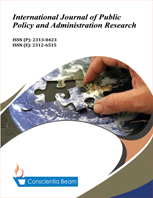Ethical and cultural guidelines in the labyrinth of Kazakhstan’s civil service
DOI:
https://doi.org/10.18488/74.v12i1.4155Abstract
This study examines the weak regulation of ethical standards and deficiencies in the organizational culture of Kazakhstan’s civil service. Despite existing legal frameworks governing ethical aspects of public administration, their implementation remains inconsistent, leading to a decline in professionalism, discipline, and governance effectiveness. The study employs an interdisciplinary approach, integrating legal, sociological, and managerial perspectives to analyze structural and procedural weaknesses in ethical regulation. A comprehensive analytical framework assesses existing legal acts, institutional mechanisms, and organizational practices, identifying gaps that undermine administrative performance. The findings highlight insufficient regulatory oversight and weak adherence to ethical norms, which negatively impact service delivery and public trust in government institutions. Without a well-defined system for enforcing ethical standards, even the most ambitious public administration reforms risk ineffectiveness. Ethical norms and a structured organizational culture are essential instruments for enhancing public service efficiency, fostering accountability, and maintaining citizens' trust. Strengthening enforcement mechanisms is crucial for sustainable administrative development. This study provides actionable recommendations for modernizing Kazakhstan’s civil service, proposing strategies to enhance ethical compliance, improve institutional accountability, and reinforce professional integrity. These insights may also be applied to similar national administrative systems facing comparable governance challenges.

